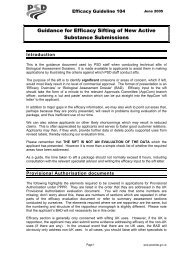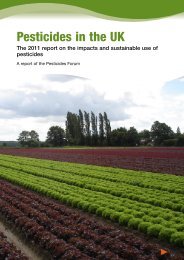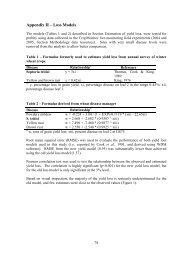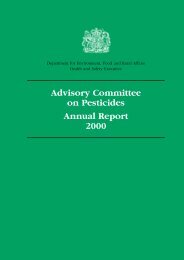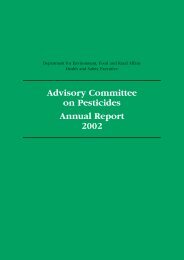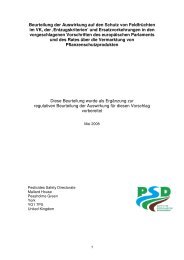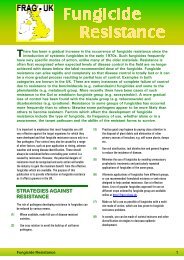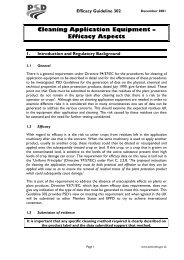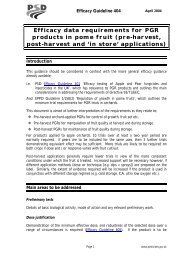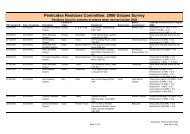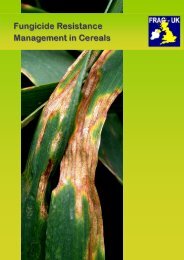Advisory Committee on Pesticides Annual Report 2001
ACP Annual Report 2001 - Pesticides Safety Directorate
ACP Annual Report 2001 - Pesticides Safety Directorate
Create successful ePaper yourself
Turn your PDF publications into a flip-book with our unique Google optimized e-Paper software.
<str<strong>on</strong>g>Advisory</str<strong>on</strong>g> <str<strong>on</strong>g>Committee</str<strong>on</strong>g> <strong>on</strong> <strong>Pesticides</strong> <strong>Annual</strong> <strong>Report</strong> <strong>2001</strong><br />
Documents detailing the <str<strong>on</strong>g>Committee</str<strong>on</strong>g>’s evaluati<strong>on</strong> of individual active<br />
substances are published. A list of those available (as at 31 December <strong>2001</strong>)<br />
can be found at Appendix V. Documents can be obtained <strong>on</strong> written<br />
applicati<strong>on</strong> to the Finance and Corporate Services Unit, Mallard House,<br />
Kings Pool, 3 Peasholme Green, York, YO1 7PX.<br />
The roles of the <strong>Pesticides</strong> Safety Directorate and the Health and<br />
Safety Executive<br />
The <strong>Pesticides</strong> Safety Directorate (PSD), an executive agency of the<br />
Department for Envir<strong>on</strong>ment, Food and Rural Affairs, administers the<br />
regulati<strong>on</strong> of pesticides used in agriculture, horticulture, forestry, food<br />
storage and the home garden.<br />
For n<strong>on</strong>-agricultural pesticides (e.g. mas<strong>on</strong>ry biocides and marine anti-fouling<br />
products), this role is taken by the Biocides and <strong>Pesticides</strong> Assessment Unit<br />
(BPAU) of the Health and Safety Executive (HSE).<br />
4<br />
The principal functi<strong>on</strong>s of the PSD and the BPAU of HSE are to evaluate and<br />
process applicati<strong>on</strong>s for approval of pesticide products for use in Great Britain<br />
and to provide advice to Government <strong>on</strong> pesticides policy. The PSD and the<br />
BPAU also provide the secretariat for the ACP.<br />
In order to obtain approval for a new pesticide, or to secure the c<strong>on</strong>tinued<br />
approval of an existing pesticide, an extensive package of scientific data must<br />
be submitted addressing its identity; functi<strong>on</strong>; efficacy; the risks it could<br />
present to humans, n<strong>on</strong>-target creatures and plants and to the envir<strong>on</strong>ment;<br />
and the effectiveness of any measures to reduce risks. With regard to potential<br />
risks to humans, account must be taken of exposures that might occur in<br />
applicati<strong>on</strong> of the pesticide, through c<strong>on</strong>tact with treated plants or materials<br />
(e.g. workers picking treated crops), and through c<strong>on</strong>sumpti<strong>on</strong> of food<br />
derived from treated crops.<br />
Openness<br />
In order to assist in making informati<strong>on</strong> <strong>on</strong> the pesticide approvals process<br />
available, agendas of meetings are displayed <strong>on</strong> the ACP website in advance<br />
of meetings and draft minutes of meetings are displayed <strong>on</strong> the website three<br />
weeks after each meeting. Minutes are finalised at the following meeting and<br />
the website is subsequently updated.<br />
The website address is www.pesticides.gov.uk/committees/acp




